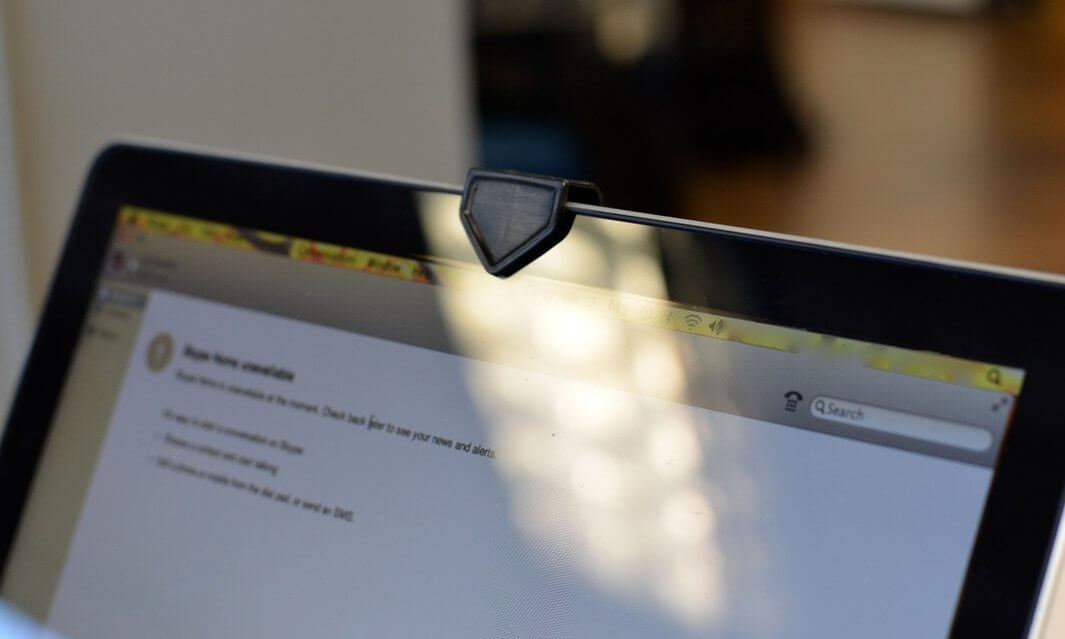Stickers and slides serve to ease concerns that spooks could be watching our every move, as even the FBI director says he puts tape on his cameras
For the past half decade, the technology industry has been racing to build better cameras into the hardware we use every day.
Yet the surveillance age has inspired an odd cottage industry battling against this trend: a glut of cheap stickers and branded plastic slides designed to cover up the front-facing cameras on phones, laptops, and even televisions.
For years, security researchers have shown that hackers can hijack the cameras to spy on whoever is on the other end. To put that in perspective, think of all the things your devices have seen you do.
Such warnings have finally caught on. Last month, the FBI director, James Comey, told an audience: “I put a piece of tape over the camera because I saw somebody smarter than I am, had a piece of tape over their camera.”
The corporate swag company Idea Stage Promotions describes its Webcam Cover 1.0 as “the HOTTEST PROMOTIONAL ITEM on the market today”. The cable channel USA Networks sent journalists a “Mr. Robot” webcam cover for the popular hacker thriller’s upcoming season.
Covering cameras isn’t new for those who know that the internet is always watching. Eva Galperin, a policy analyst for the Electronic Frontier Foundation, says that since she bought her first laptop with a built-in camera on the screen, a MacBook Pro, in 2007, she’s been covering them up.
EFF started printing its own webcam stickers in 2013, as well as selling and handing out camera stickers that read: “These removable stickers are an unhackable anti-surveillance technology.”
“People purchase these regularly,” a spokesman said.
The fear over web cameras has penetrated deep into popular culture. The trailer for Oliver Stone’s forthcoming biopic Snowden, on the US spy contractor, features a clip of actor Joseph Gordon-Levitt, who plays the title character, looking nervously at his laptop camera during an intimate moment with his girlfriend.
So are we all being paranoid? Well, it’s not science fiction. Researchers in 2013 showed how they could activate a Macbook’s camera without triggering the green “this-thing-is-on” light. One couple claimed a hacker posted a video of them having sex after hacking their smart TV. And federal court records shows that the FBI does know how to use laptop cameras to spy on users as well.
So, naturally, where there’s fear, there is money to be made.
The DC-based CamPatch describes itself as “the Mercedes Bens [sic] of putting tape over your webcam”. Its founders started the company in 2013 after hearing a briefing from Pentagon cybersecurity experts on how webcams were a new “attack vector”, said Krystie Caraballo, CamPatch’s general manager.
Caraballo wouldn’t disclose financials other than to say the company has had “six-figure revenues for the last several years” and that it has distributed more than 250,000 patches. The company advertises bulk pricing “as low as $2.79”.
Yet not everyone is on the camera-covering bandwagon. Brian Pascal, a privacy expert who has worked for Stanford and Palantir Technologies says a cost-benefit analysis led him to conclude he’d rather have a usable camera, which he can use to record his son. But he acknowledged such stickers are a way for people signal that they too worry about Big Brother.
“Security actions without threat modelling are just performative,” said Pascal.
Others just haven’t gotten around to it yet.
“Because I’m an idiot,” replied Matthew Green, an encryption expert at Johns Hopkins University when asked why he doesn’t cover his cameras. “I have no excuse for not taking this seriously … but at the end of the day, I figure that seeing me naked would be punishment enough.”
Of course, webcam paranoia is likely to be only the first of many awakenings as consumers bring more devices into their lives that can be turned into unwitting spies. Amazon.com has had enormous success with its Echo smart speaker that, by default, is always listening for its owners’ commands. Google plans to release a similar product this year called Google Home.
In a hearing on Capitol Hill in February, the US director of national intelligence,James Clapper, acknowledged how the so-called “internet of things” could be used “for identification, surveillance, monitoring, location tracking, and targeting for recruitment, or to gain access to networks or user credentials”.
Article Provided By: theguardian
![]()
If you would like liquidvideotechnologies.com to discuss developing your Home Security System, Networking, Access Control, Fire, IT consultant or PCI Compliance, please do not hesitate to call us at 864-859-9848 or you can email us at deveren@liquidvideotechnologies.com


Recent Comments